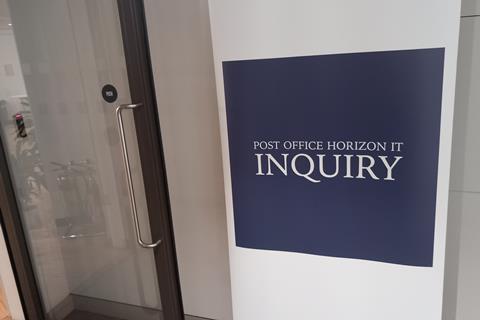The inquiry into the Post Office scandal was dramatically halted this morning as it emerged that thousands of potentially relevant documents had not been disclosed.
The Post Office contacted the inquiry at 10.32pm last night to say it had identified a new document among 95 recently disclosed that was ‘likely to be of significant interest’.
In the same letter, the Post Office revealed that a further 4,767 documents, not previously disclosed to the inquiry, may be relevant to the evidence of former Fujitsu engineer Gareth Jenkins. He was due to appear today and tomorrow to give evidence about the Horizon system used in the prosecution of hundreds of Post Office workers in the last 20 years.
Jenkins’ appearance was postponed following the disclosure failings. He will be called to a hearing later this year.
The Post Office apologised to the inquiry for sending these documents so late and causing the hearing to be aborted. Jason Beer KC, counsel to the inquiry, said the situation was ‘grossly unsatisfactory’.

Inquiry chair Sir Wyn Williams will issue directions to the Post Office this week that seek to ensure disclosure issues do not continue.
He said today: ‘I cannot help but express my frustration that this has happened at this time. It is a very important time for the inquiry, and we do not need dislocation. Clearly, the evidence which was intended to be heard was of considerable significance, and of interest to very many people.’
Ben Foat, group general counsel for Post Office Limited, was summoned to explain on Tuesday why a key document had only been disclosed as part of a freedom of information request in April, when the inquiry had specifically asked a year earlier for all documents relevant to the prosecution.
The document in question contained a series of identification codes using racist and offensive terms for suspects, which was emailed as an internal attachment some 23 times between 2012 and 2019.
Foat revealed that between four and eight in-house Post Office lawyers, as well as 46 from Herbert Smith Freehills and five from Peters & Peters, are now working on disclosure and remediation issues.
Beer today noted that the inquiry is itself investigating the late or non-provision of disclosure by the Post Office in a series of criminal prosecutions which lasted over a decade, and the non-disclosure of documents in civil proceedings, and the unfairness that such non-disclosure had on parties and on witnesses.
He added: ‘We of all people will not entertain the making of the same mistakes of the past whilst simultaneously investigating those mistakes.’
A Post Office spokesperson today said it takes its legal obligations of disclosure extremely seriously and has appointed expert leading law firms together with an internal team to assist the Inquiry.
She added: 'Disclosure involves documentation spanning a period of more than two decades, with searches of around 230 physical locations and third-party sites, in addition to hundreds of digital repositories and mailboxes; more than 54 million documents in total. The scale of this exercise has created challenges and we have taken urgent steps to address issues that have arisen.'
As of 4 July, 122,500 documents had been disclosed to the inquiry.
This article is now closed for comment.































17 Readers' comments